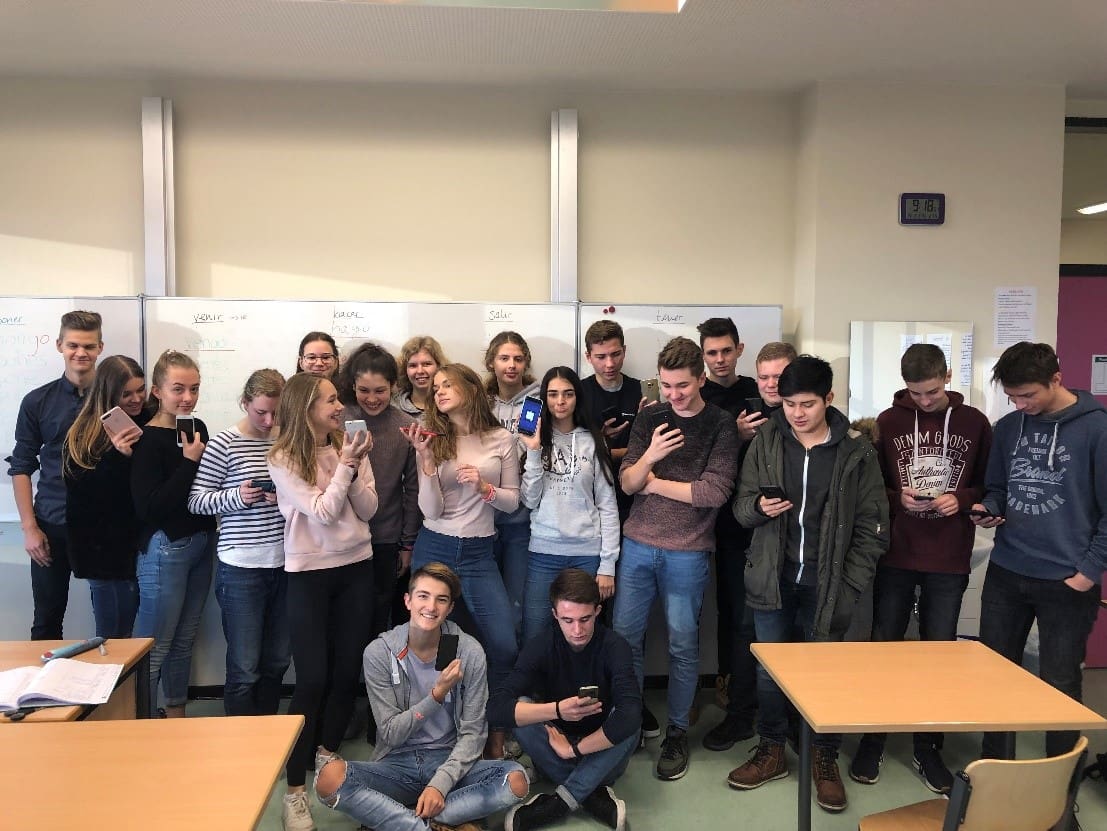Eine Woche ohne Handy – dieser Herausforderung haben wir uns gestellt. Unser Umgang mit dem Social-Media-Entzug war unterschiedlich, genau wie unser Durchhaltevermögen. Ein paar gaben schon nach den ersten Stunden beziehungsweise im Verlauf des ersten Tages auf. Die meistens schafften es bis zum Ende, aber nicht ohne zu schummeln. Das nahm die unterschiedlichsten Formen an; von dem einen wichtigen Anruf, den man unbedingt tätigen musste bis hin zu einer Datei, die man auf dem Handy gespeichert hatte und auf die man zugreifen musste. Um zu sehen, was andere Schüler unserer Schule vom Handyverzicht halten und wie sie ihre Handys im Alltag nutzen, haben wir eine Umfrage mit einhundert Vierzehn- bis Achtzehnjährigen an unserer Schule durchgeführt.
Could you imagine living without your phone? The majority of the fourteen to eighteen-year- old students we questioned stated that they couldn`t. After all, the phone plays a huge part in our everyday life. Communication without it seems impossible.
We use WhatsApp to chat with our friends, some of whom don´t even live in the same time zone. On Instagram, we create a picture of ourselves by taking photos and editing them until there is little resemblance to the original. Instead of enjoying a moment, we take a picture of it and quickly share it with our friends on Snapchat.
And this has become normal, hasn`t it? Hardly anyone leaves their house without the phone. While you wait for the bus, you quickly answer your latest texts. During the morning run, you have your favourite songs with you. Whenever you see something noteworthy, you take a picture – with your phone.
To find out how other students use their phones, we made a survey where we questioned about 100 students from our school aged 14 to 17. Social media was named as the most-used function by 26% of the students. This result isn`t much of a surprise, given that Instagram, WhatsApp and Snapchat play a major role in teenagers lives. However, music was a close second with 22%. While those functions are very practical, they also take up a major part of the day. More than half of the students spend about four hours a day on their phones. That is 17% of the day. Add to that eight hours spent sleeping and at least six hours of school a day, there is not much time left to spend with your friends and family, to do sports or read a book.
But what if we tried the impossible and turned off our phones for a while? What if we weren`t available at any moment of the day, what if we tried to live without all those practical functions our phones offer for a while? Would it really be that impossible – or would we maybe gain something from it?
That is the question our class, the 11D, tried to answer. For one week, we wanted to turn off our phones. And not just that: We decided to completely stop using social media and online games. We also decided to stop watching TV alone. The idea for that project came up during our English lessons, while we were talking about new technologies.
On Friday, December 14, in the second lesson, we got to spend ten final minutes on our phones before we switched them off. One week without a phone. About 45% of the students our age stated that they absolutely couldn`t imagine living without phones for that long.
In our class, five people quit the experiment. The majority of the remaining students cheated at least once for small tasks like calling the parents to pick them up or to access data stored on the phone. However, apart from small missteps, they followed the rules we set up prior to the experiment.
Being without a phone proved to be an inconvenience in several parts of everyday life. Texting and music were the functions that we missed the most. Having to use radios, laptops or mp3-players to replace the phone was certainly annoying. Another change was that you had to organise many things in advance: It was no longer possible to simply drive to the city and call your parents when you wanted to be picked up or to look up the trains you could take on google maps. If we wanted to talk to our friends after school, we needed to use the landline and hope that they were home instead of simply sending a text message.
But contrary to our expectations, living without a phone wasn`t impossible. Of course, we had to get used to it, but most of us managed. After the first few days, when we would still subconsciously reach for our phones, we had gotten used to the change and didn`t really miss our phones anymore.
We also found out that having four extra hours a day could make quite a difference. As we did our project in the week before Christmas, many of us used the additional time to go to the Christmas market with friends, buy presents or go ice skating. In general, we had much more time to meet with our friends or spent time with our families.
On Wednesday afternoon, we decided to spend some time together as a class. We met at 3.45pm in our classroom. Apart from us and Miss Knauer, some of our former classmates who had left the school last year were there as well. We had all brought some food and made sandwiches and waffles. While listening to Christmas music, we ate and talked. After a while, we divided the class into two groups and played Activity. In general, it was a very nice afternoon. We really enjoyed ourselves and would have liked to stay longer.
With all of us busy like that, it didn`t really seem like a week had passed when we met again on Friday, December 21, in the second lesson. We had all brought our phones, though they were still turned off. Some were anxiously waiting to be able to use them again, but there were also people who could have lasted longer without them.
After talking about our experiences, we switched them on together. We were given fifteen minutes with our phones to see what we had missed. The results were astonishing. Over the course of one week, a huge number of messages had amassed on the different social media accounts. On WhatsApp alone, some had more than 2000 messages.
During that week, some of us learned that living without a phone isn`t as impossible as you`d think – and that, while phones are useful and certainly play a big part in our lives, it can also feel good to switch them off sometimes. Of course, others had different experiences. Ten people in our class said afterwards that they think that they are addicted to their phones. Most of us agreed that we felt neither good nor bad without their phones.
In the end, it is up to each person individually how they will deal with the results. Of course, none of us will stop using phones for good – in modern society, it is near impossible to do that. But maybe some of us learned that it can be good to switch off the phone occasionally.





